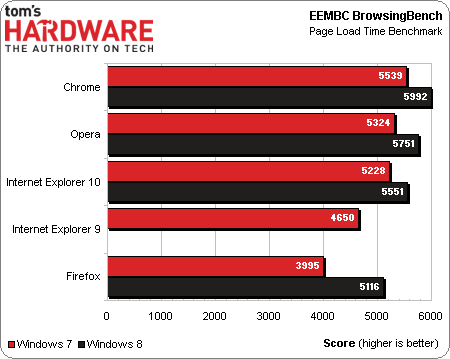Web Browser Grand Prix: Chrome 25, Firefox 19, And IE10
Important versions of Chrome and Firefox were released since our last installment, and though we're ready to leave Windows 7 behind, IE10 brings us back for one more round. Naturally, our exhaustive suite of benchmarks undergoes a massive update as well.
Page Load Time
Why you can trust Tom's Hardware
Again, we replaced our page load timers with the industry-standard BrowsingBench from The Embedded Microprocessor Benchmark Consortium (EEMBC). Unlike our page load timers, which used eight of the top 40 websites in the U.S., this benchmark includes foreign sites (a top reader request). Mobile pages and multiple pages on the same site fulfill two more wishes from our readers, and multiple iterations per test run means more even runs.
The finishing order in this test remains constant on both platforms: Chrome, Opera, IE10 (IE9), Firefox. While all browsers do slightly better in Windows 8, the boost that Firefox receives is quite substantial.
Now let's see if Mozilla's new IonMonkey JavaScript engine kicks Firefox into overdrive.
Get Tom's Hardware's best news and in-depth reviews, straight to your inbox.
